 W
WThe Turbellaria are one of the traditional sub-divisions of the phylum Platyhelminthes (flatworms), and include all the sub-groups that are not exclusively parasitic. There are about 4,500 species, which range from 1 mm (0.039 in) to large freshwater forms more than 500 mm (20 in) long or terrestrial species like Bipalium kewense which can reach 600 mm (24 in) in length. All the larger forms are flat with ribbon-like or leaf-like shapes, since their lack of respiratory and circulatory systems means that they have to rely on diffusion for internal transport of metabolites. However, many of the smaller forms are round in cross section. Most are predators, and all live in water or in moist terrestrial environments. Most forms reproduce sexually and with few exceptions all are simultaneous hermaphrodites.
 W
WAcotylea is a suborder of free-living marine turbellarian flatworms in the order Polycladida.
 W
WCallioplana marginata is a species of flatworm polyclads belonging to the Callioplanidae family.
 W
WThe carpet flatworm is a polyclad flatworm in the family Pseudocerotidae.
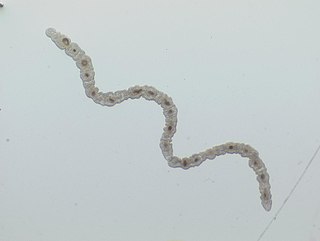 W
WCatenulida is an order of flatworms in the classical classification, or a class of flatworms in a phylogenetic approach. They are relatively small free-living flatworms, inhabiting freshwater and marine environments. There are about 100 species described worldwide, but the simple anatomy makes species distinction problematic.
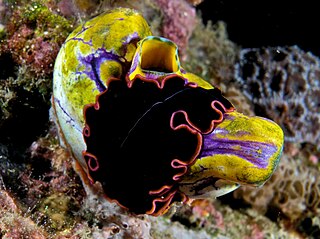 W
WCotylea is a suborder of free-living marine turbellarian flatworms in the order Polycladida.
 W
WThe Dolichomacrostomidae are a family of small basal free-living flatworms, and members of the marine, but also brackish, meiobenthos. The name was coined by Reinhard M. Rieger (1971), who designated the Dolichomacrostomidae as a family within the taxon Macrostomida. There are currently about 40 named species in this family.
 W
WEuryleptidae is a family of marine polyclad flatworms.
 W
WThe Macrostomida are a taxon of small basal free-living flatworms, which inhabit freshwater, brackish, and marine environments. The taxon name was coined by Josef Meixner (1924). There are currently about 260 named species in this taxon.
 W
WThe Macrostomidae are a family of small basal free-living flatworms, and members of the marine, brackish, freshwater meiobenthos. There are currently about 180 named species in this family.
 W
WMaritigrella fuscopunctata is a species of marine polyclad flatworm in the family Euryleptidae from Indo-Pacific .
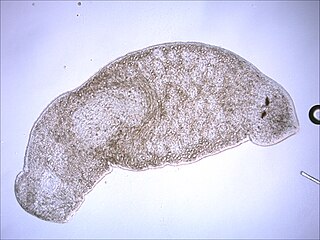 W
WMonocelididae is family of marine turbellarian flatworms in the order Proseriata, sub order Lithophora.
 W
WA planarian is one of many flatworms of the traditional class Turbellaria. It usually describes free-living flatworms of the order Tricladida (triclads), although this common name is also used for a wide number of free-living platyhelminthes. Planaria are common to many parts of the world, living in both saltwater and freshwater ponds and rivers. Some species are terrestrial and are found under logs, in or on the soil, and on plants in humid areas.
 W
WThe Polycladida represents a highly diverse clade of free-living marine flatworms. They are known from the littoral to the sublittoral zone, and many species are common from coral reefs. Only a few species are found in freshwater habitats.
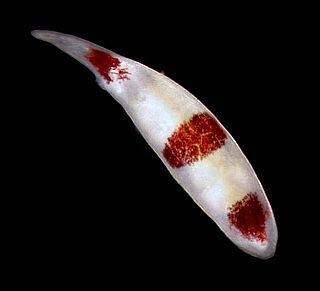 W
WThe Prolecithophora are an order consisting of an estimated 300 species of small, active, aquatic flatworms. The order lacks a common English name. Most species are shaped like an elongated, stylized droplet, and are opaque white or yellow; they frequently have contrasting bands or spots in colors, such as purple, yellow, red, or brown. They have no to three pairs of pigment-cup eyes, and well-developed tactile and chemoreceptor senses. With few exceptions, species are protandric hermaphrodites with internal fertilization. Egg capsules are, according to species, glued to various hard surfaces; the young hatch as miniature copies of their parents.
 W
WProstheceraeus vittatus, the candy striped flatworm, is a species of marine polyclad flatworm in the family Euryleptidae. It is found in Western Europe, including on the western coasts of the British Isles.
 W
WProsthiostomidae is a family of free-living marine polyclad flatworms in the suborder Cotylea.
 W
WPseudobiceros bedfordi, is a species of flatworm in the family Pseudocerotidae.
 W
WPseudobiceros gloriosus is a benthic marine flatworm species that belongs to the Pseudocerotidae family. It is typically found in the Tropical Indo-Pacific, from Eastern Africa to Micronesia, in the Top or slope of recifal reefs. It can be up to 3 in. (7.6 cm.) in length, and feeds on a multitude of invertebrates as gastropods and small crustaceans by engulfing their prey whole.
 W
WPseudobiceros hancockanus is a species of hermaphroditic marine flatworm in the family Pseudocerotidae.
 W
WPseudoceros bifurcus is a marine flatworm species that belongs to the family Pseudocerotidae.
 W
WPseudoceros dimidiatus, the divided flatworm or tiger flatworm, is a species of flatworm in the genus Pseudoceros, belonging to the family Pseudocerotidae.
 W
WPseudoceros ferrugineus, the Fuchsia flatworm, is a marine flatworm species that belongs to the Pseudocerotidae family.
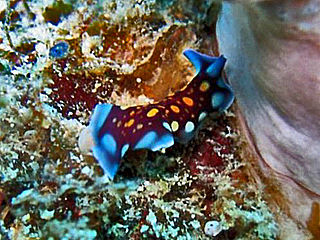 W
WPseudoceros lindae, common name Linda's flatworm, is a marine Flatworm species that belongs to the Pseudocerotidae family.
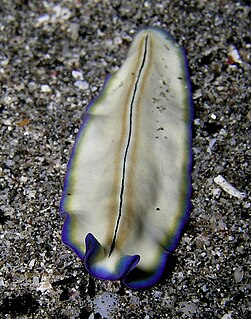 W
WPseudoceros monostichos is a marine flatworm species that belongs to the Pseudocerotidae family.
 W
WPseudoceros susanae is a marine flatworm species that belongs to the Pseudocerotidae family.
 W
WPseudocerotidae is a family of flatworms which includes the Bedford's flatworm.
 W
WThysanozoon nigropapillosum is a species of polyclad flatworms belonging to the family Pseudocerotidae. Some common names include gold-speckled flatworm, marine flatworm, yellow papillae flatworm, yellow-spotted flatworm, and yellow-spotted polyclad flatworm.